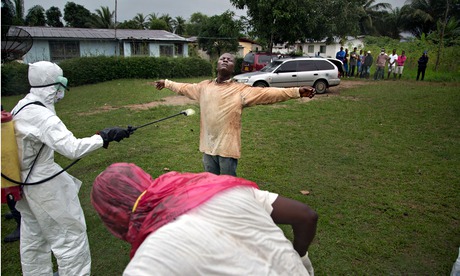
Health workers on the Ebola frontline are and always have been at the highest risk of contracting the disease. Ebola becomes more contagious the sicker patients get. By the time they are in the care of doctors and nurses, patients have become a serious danger to the lives of those treating, washing and attempting to rehydrate them.
But in countries such as the US and Spain, which have sophisticated healthcare systems and well-equipped hospitals, healthcare workers should be safe. It is shocking that workers in Spain and now Texas have contracted Ebola from patients they were treating.
As Médecins sans Frontières has proved, it is possible to keep health workers safe even in the difficult setting of west Africa, where an isolation ward can be no more than an area behind a canvas tent flap. The vital elements are vigilance and strict adherence to the rules.
The Texas health worker was reportedly wearing full protective gear – gown, gloves, mask and shield – while providing care for the patient who later died. Either that equipment failed or correct procedures were not followed.
Dr Tom Frieden, head of the US Centers for Disease Control and Prevention, suggested on Sunday that there had been a breach in protocol, saying that one focus of the investigation will be the possibility that the health worker took off protective gear incorrectly.
Personal protective suits keep the virus off the body but removing them safely is a skill in itself. It is possible to transfer the virus from the outside of the suit on to the hands. From there it takes a moment’s thoughtlessness to touch the face. The virus enters the body through eyes, nose or mouth or any abrasion on the skin.
In Africa it is so much harder to be safe. The suits are hot, there are not enough available, and doctors and nurses are hard-pressed because there are too few of them to cope with the soaring number of cases. In Liberia there was a critical health worker shortage even before Ebola broke out. Fear over dangerous working conditions was as strong a motivation for recent strikes as very low pay. The government in June doubled the pay of nurses because of the hazard, but was told by the World Bank to rescind the offer, which would have busted the health budget.
Better conditions for health workers in Africa are vital. That is going to have to involve increasing their number and improving training. There will still be, for a while, a shortage of experienced people to supervise and ensure procedures are followed. West Africa needs a great deal of help from the west.
